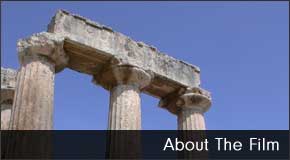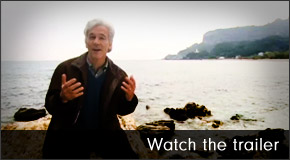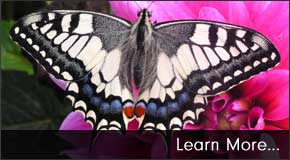Journey of the Universe Conversations
Program Previews
Formerly titled "Educational Series"
Twenty-part series (30 minutes each) in a 4-DVD Set
Available for Purchase
Flyer with list of contents
Conversations with Scientists, Environmentalists, and Educators
Hosted by Mary Evelyn Tucker, Yale University
Highlights from Conversations:
1. Beginning of the Universe
Joel Primack describes the emergence of the universe, the universe’s expansion, and the formation of the first elements, stars, and galaxies. This conversation also includes explanations of cold dark matter and dark energy.
2. Galaxies Forming
Todd Duncan and Joel Primack explore the formation of galaxies from the hot, energetic state of the early universe. These interviews cover topics ranging from the shapes of galaxies to the formation of the Milky Way.
3. The Emanating Brilliance of Stars
Joel Primack and Todd Duncan describe the emergence and death of stars. They trace elements found in all life on Earth, including those found in our bodies, back to supernova explosions.
4. Birth of the Solar System
Craig Kochel describes the evolution of our solar system and its planets. Included in this conversation are the origins of the Moon, the creative dynamism of plate tectonics, and the impact of geology on Earth’s biology.
5. Life’s Emergence
Ursula Goodenough and Terry Deacon explore the complexities of the emergence of the first cells and the intricate patterning found in DNA and multicellular organisms.
6. Learning, Living, and Dying
The evolution of the brain is a story of adaptation, consciousness, and responsiveness that begins with single celled organisms and continues through the vertebrates. Here, Terry Deacon compares the adaptive brains of humans, chimpanzees, and our many evolutionary ancestors. For more on this topic, see "The Age of Humans: Evolutionary Perspectives on the Anthropocene."
7. The Passion of Animals
Scott Sampson tells the compelling story of Earth’s fossil record. Touching on topics ranging from the ancient ecosystems of dinosaurs to the co-evolution of the human with other species, this interview highlights the importance of understanding mass extinctions.
8. The Origin of the Human
Drawing upon the history of early humans and highlighting contemporary indigenous lifeways, John Grim and Melissa Nelson explain the sustaining power of ritual and celebratory acts that locate humans within the rhythms of Earth’s transformative systems. For more on this topic, see "The Age of Humans: Evolutionary Perspectives on the Anthropocene."
9. Becoming a Planetary Presence
Cynthia Brown describes the “big history” approach to understanding the role of the human in relation to the historical unfolding of the cosmos and Earth. She highlights key threshold moments of evolutionary change.
10. Transition
Mary Evelyn Tucker, Co-Director, Forum on Religion and Ecology, School of Forestry and Environmental Studies, Yale University introduces a collection of creative thinkers who are drawing upon the story of the universe to re-envision and create mutually enhancing human-Earth relations.
11. Breakthrough Communities
Carl Anthony tells how the universe story expanded his own understanding of race and environmental justice. With a focus on urban and metropolitan areas, he explains the practical implications of a functional cosmology for sustainable community development.
12. Eco-Cities
By emphasizing an organic and evolutionary whole-city perspective, Richard Register draws attention to the imaginative ways in which cities are being rethought and rebuilt around the planet for a flourishing, sustainable future.
13. Ecological Economics
Richard Norgaard surveys the history of human economies and the myths and premises of current economic practices. In place of our ecologically destructive practices, he endorses an ecological economics that emphasizes care, co-evolution, and protection of the environment.
14. Permaculture
Penny Livingston leads viewers through the history and significance of permaculture. She discusses permaculture as an agricultural practice that increases biodiversity and helps us to understand our place in the story of the universe.
15. Indigenous Ways of Knowing
David Begay and Nancy Maryboy invite us to understand Navajo ways of knowing. They describe a worldview that is place-based, emphasizes kinship and connection, and intimately orients the human within an interrelated and unified cosmos.
16. Sustainable Energy
Paula Gonzalez narrates the efforts of Catholic sisters to harness solar power and other natural systems as a means of protecting the Earth community and participating in the story of the universe.
17. Healing and Revisioning
Belvie Rooks describes how teaching the story of the universe has empowered African American youth to contextualize slavery, envision healing and reconciliation, and imagine a better future through a broader sense of self and of place.
18. Arts and Justice
Whether through poetry and activism, the study of science, or participating in a Crow Sundance, Drew Dellinger and Marya Grathwohl express shared visions of creative transformation that are inspired by the journey of the universe.
19. Myths, Metaphors, and Identities
Nancy Abrams and Sachiko Kawaura highlight the role of myth, metaphor, and art in broadening and deepening our understanding of human identity within a cosmological context.
20. Teaching Journey of the Universe
Tom Collins and Bindu Mohanty describe how learning the universe story has allowed high school and college students to experience an expanded sense of self and to transform despair into a sense of hope and empowerment.




































